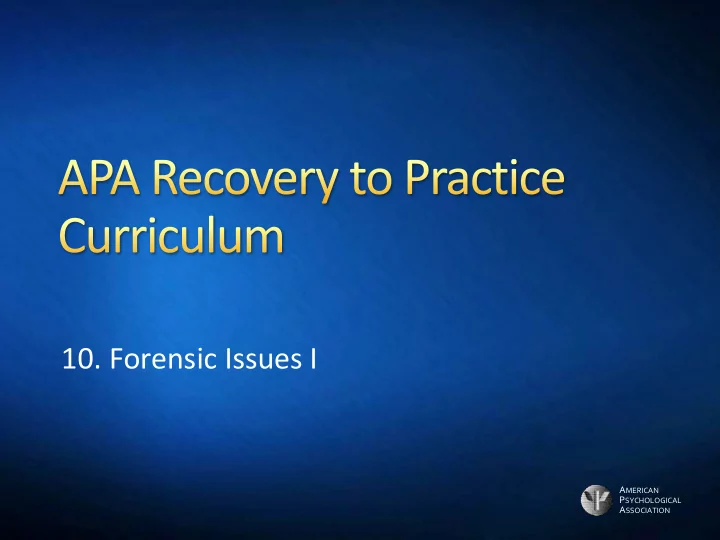

10. Forensic Issues I A MERICAN P SYCHOLOGICAL A SSOCIATION
Forensic Issues For people with SMI, the prevalence of containment in prison/forensic system is high: men 15%; women 31% For people exhibiting symptoms: 67 % greater likelihood of arrest African American men especially at risk Multitude of co-occurring problems: Severe trauma Homelessness Substance abuse Victimization Poor health A MERICAN P SYCHOLOGICAL A SSOCIATION
Forensic Issues, cont’d Criminal Justice/Forensic systems antithetical to concept of recovery: Little treatment, emphasis on risk reduction Respect, person centered, cultural considerations, EBPs: not the norm in criminal justice/forensic settings Criminal justice/forensic settings are extremely re-traumatizing Insufficient resources Personnel receive little to no training re people with mental health disorders Extremely stigmatized by dual stigma – serious mental illness & criminality A MERICAN P SYCHOLOGICAL A SSOCIATION
Homelessness Due to double stigma of criminality and mental illness, little housing stock available Co-occurring Substance Abuse More hospitalizations Higher suicide rate Poor social functioning Homelessness Violence People often excluded from treatment services A MERICAN P SYCHOLOGICAL A SSOCIATION
Trauma People with serious mental illnesses twice as likely to be victims of violence as those without illnesses Importance of trauma, especially for women cannot be overstated: Trauma is the norm, especially for women: virtually all women in the criminal justice/forensic system have experienced severe trauma ; most men have as well Criminal justice/forensic systems are universally re- traumatizing Effects of trauma so severe that mental health providers must use extreme care to avoid re-traumatizing people A MERICAN P SYCHOLOGICAL A SSOCIATION
Racial and Cultural Factors Clear differences in treatment for people of color African Americans especially overrepresented in criminal justice & forensic settings Those with mental illnesses often mis-labelled as criminals Immigrants, refugees and people from diverse cultural backgrounds affected by many issues: Language barriers Fear of authoritarian systems Different beliefs about mental illness Different cultural values: Women and children often not allowed to speak for themselves Acceptability of familial abuse A MERICAN P SYCHOLOGICAL A SSOCIATION
Citation for this Module: American Psychological Association & Jansen, M. A. (2014). The Forensic System and Related Issues I: Homelessness, Substance Abuse, Trauma, Gender, Race, and Culture. Reframing Psychology for the Emerging Health Care Environment: Recovery Curriculum for People with Serious Mental Illnesses and Behavioral Health Disorders. Washington, DC: American Psychological Association. www.apa.org/pi/rtp Citation for the full Curriculum: American Psychological Association & Jansen, M. A. (2014). Reframing Psychology for the Emerging Health Care Environment: Recovery Curriculum for People with Serious Mental Illnesses and Behavioral Health Disorders. Washington, DC: American Psychological Association. mjansen@bayviewbehavioral.org or jansenm@shaw.ca August, 2014 A MERICAN P SYCHOLOGICAL A SSOCIATION
Recommend
More recommend